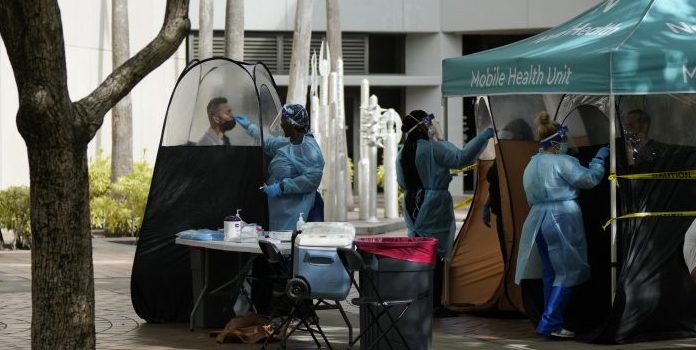People who test positive for COVID-19 no longer require a negative test at the end of a shortened period of isolation, according to new guidelines from the Centers for Disease Control and Prevention.
“People who test positive should isolate for 5 days and, if asymptomatic at that time, they may leave isolation if they can continue to mask for 5 days to minimize the risk of infecting others,” the updated guidelines said.
The change, according to the CDC, “is motivated by science demonstrating that the majority of SARS-CoV-2 transmission occurs early in the course of illness, generally in the 1-2 days prior to onset of symptoms and the 2-3 days after.”
CDC Director Rachel Walensky, during an appearance on “Good Morning America,” called into question the usefulness of both PCR and “antigen” tests in the context of a quarantine.
A PCR test is “not viable because [the test] can stay positive for up to 12 weeks,” Walensky said, and “we don’t know how [the antigen test] performs with regard to predicting transmissibility towards the end of your period of infection.”
Dr. Rochelle Walensky discusses new questions about COVID rapid tests amid rising cases. @CDCDirector#COVID19#Omicronhttps://t.co/kaBqUH9xCY pic.twitter.com/j2fTMx2f3s
— Good Morning America (@GMA) December 29, 2021
In response to a question regarding the trustworthiness of the antigen test, Walensky told ABC that while the CDC still encourages their use, they “may not work as well as they had for the Delta variant.”
The new guidelines have raised concerns among “health experts,” according to NPR.
CDC’s new guidance to drop isolation of positives to 5 days without a negative test is reckless
Some ppl stay infectious 3 days,Some 12
I absolutely don’t want to sit next to someone who turned Pos 5 days ago and hasnt tested Neg
Test Neg to leave isolation early is just smart
— Michael Mina (@michaelmina_lab) December 27, 2021
NYU’s Dr. Celine Gounder accused the CDC of lying about the reason for the change.
The updated guidelines are “an example of scarcity determining policy,” Gounder told NPR. The tests “could work,” but there “are just not enough tests readily available.”

